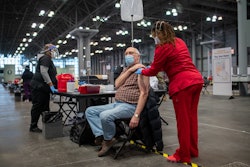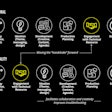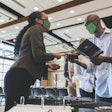
From the outset of the COVID-19 pandemic, one of the hardest hit divisions within the event industry has been hospitality workers. With the shutdown of bars, restaurants, and venues, many cooks, waiters, bussers, and bartenders have found themselves out of work and without much of a safety net.
 The Jitjatjo app now lets hospitality workers apply for temporary jobs at city and state government entities as well as hospitals.Photo: Courtesy of Jitjatjo
The Jitjatjo app now lets hospitality workers apply for temporary jobs at city and state government entities as well as hospitals.Photo: Courtesy of Jitjatjo
Typically, Jitjatjo provides talent to restaurants and catering companies as well as large hospitality organizations including Convene, Macy’s, the Jacob K. Javits Convention Center, McCormick Place, and the Walter E. Washington Convention Center. Before being hired, applicants undergo a skills assessment, in-person interviews (which now take place via video), and reference and background checks. The platform also handles bookkeeping services such as payroll.
But now the platform is serving a different type of client—government-run facilities and medical sites. So far, Jitjatjo has been able to generate more than 1,200 jobs at places like the Javits Center, New York-Presbyterian Hospital, and the field hospital at the US Open tennis courts in Queens.
Here, the company's founder, Tim Chatfield, shares with BizBash how hospitality workers can find jobs right now and how their skill sets translate to other industries.
Tell us about the #hirehospitality campaign and how it works.
#Hirehospitality was designed to recognize the versatility of hospitality workers and help them earn an income during this crisis, while supporting industries in desperate need of hourly employees. We have launched the website [hirehospitality.org] to help build a community that is able to support and champion furloughed hospitality workers.
To become part of the program, displaced hospitality workers in need of employment can register via the Jitjatjo Flex app. As gigs become available, our platform uses empathic intelligence to match those gigs with qualified talent. To ensure employees and employers feel safe and are fully aware of COVID-19 safety procedures, we have created a free COVID-19 Awareness and Hygiene Training accreditation [based on guidance from the WHO and CDC] that we offer to all of our talent.
[Empathic intelligence is the use of artificial intelligence to predict and influence human behavior by detecting and responding to emotions. Jitjatjo uses this to quickly match businesses with vetted industry professionals.]
What type of jobs are now available to hospitality workers through this program?
We are providing cooks and other back-of-house staff, like general utility, porters, and dishwashers, to permanent and temporary hospitals and picker/packers to producers shipping farm-to-table food. [We] see opportunities for hospitality workers to help in warehousing and distribution of essential household goods, together with grocery [stores] and supermarkets. Companies that have booked shifts with us and our employees include the Javits Center, New York-Presbyterian Hospital, and the new field hospital development at the US Open tennis center.
 Jitjatjo launched the #hirehospitality campaign to recognize the versatility of hospitality workers and help them earn an income during this crisis.Photo: Courtesy of Jitjatjo
Jitjatjo launched the #hirehospitality campaign to recognize the versatility of hospitality workers and help them earn an income during this crisis.Photo: Courtesy of Jitjatjo
We've had a lot of success with hospitality professionals, both front- and back-of-house, who can apply their training, experience, and passion for making people feel good in new environments. General utility hospitality workers can also operate as warehouse staff; dishwashers can be cleaners in other environments; cooks can work in stocking; cashiers can be clerk; porters can work in delivery; and bartenders can be utilized as greeters.
How can hospitality workers apply?
Displaced hospitality workers in need of employment can apply via the Flex app by Jitjatjo and complete a virtual interview with the Jitjatjo team.
How do you think the pandemic will impact the future of staffing within the hospitality industry?
We foresee the hospitality industry moving to a more flexible labor model to optimize staffing levels and align with demand. As people continue to look for work, the importance of transferring a skill set to a new industry or opportunity will increase as the hospitality industry will take longer to recover from the COVID-19 pandemic than many other industries.
Do you think this could ultimately have a positive effect on workers’ pay and benefits?
It’s hard to predict what the overall impact will be. However, due to the rapidly evolving situation, the need for a flexible labor model has never been greater. Organizations are being forced to rethink their labor strategies to accommodate the inevitable ebbs and flows that will come as the industry rebuilds.
Further Reading: See BizBash's coverage of how COVID-19 is affecting the event industry at bizbash.com/coronavirus.



















